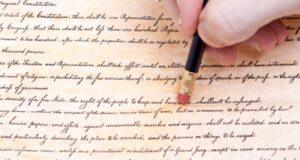|
Listen To The Article
|

Erasing The Physical Preservation Of Our Freedoms
Immediately after 9/11, there was a groundswell of support for anything the government deemed necessary to make us safer. American flags flew on every car and new legislation passed at a dizzying rate as everyone wanted to do something, anything, to let the world know we weren’t going to just sit here and be a target for every two-bit terrorist that wanted to make a name for himself.
There result, among other things, was the behemoth we now know as the Department of Homeland Security. The idea seemed right: ensure that all of our intelligence and law enforcement agencies coordinated their efforts in a way that made identifying and stopping terrorist acts before they happened easier. An overwhelming majority of Americans approved, and most of us felt safer.
A decade later, America experienced its first major terrorist attack that captured national attention. But the public reaction after the April 15 Boston Marathon bombing, in which a pair of Islamic radicals are accused of planting explosives and taking lives, is somewhat different. Many Americans aren’t quite as eager to give up individual freedoms in exchange for enhanced security as they were ten years ago.
A Fox News National Poll taken the day after the Boston bombing reveals a far different reaction than the days after 9/11. The question was asked, “Would you be willing to give up some of your personal freedom in order to reduce the threat of terrorism?” And, for the first time since May 2001, more Americans answered “no” than “yes.”
Of those surveyed on April 16, 2013, 45 percent answered no to the question, compared to 43 percent answering yes. In May 2001, before 9/11, the balance was similar, with 40 percent answering no to 33 percent answering yes. But following the terrorist attacks of 9/11, the numbers flipped radically, to 71 percent approving of sacrificing personal freedom to reduce the threat of terrorism.
They pledged their lives, their fortunes, and their sacred honor so that we could be free!
Similar polls asked the same question in 2002, 2005, and 2006 and found Americans willing to give up freedom in exchange for security. However, the numbers declined from 71 percent following 9/11 to only 54 percent by May 2006.
It appears that a quote attributed to Benjamin Franklin – “They who can give up essential liberty to obtain a little temporary safety, deserve neither liberty nor safety” – is being embraced by more Americans than in a number of years before.
A Washington Post poll recently asked: “Which worries you more: that the government will not go far enough to investigate terrorism because of concerns about constitutional rights, or that it will go too far in compromising constitutional rights in order to investigate terrorism?”
Almost half of those polled said they feared the government will go too far, compared to 41 percent who were concerned it won’t go far enough.
So what has happened in those intervening years to erode Americans confidence in its government to ensure their safety without taking away basic rights of personal freedom? Perhaps the following might offer a clue:
- Department of Homeland Security training videos depicting raids on home of suspected terrorists – except the actors appear to be an average middle-class family, none of whom fit any profile of actual terrorists arrested over the last decade of America’s “war on terror.”
- Police officers teaming with National Guard and other U.S. military units to carry out training exercises that resemble military invasions on U.S. soil in violation of Posse Comitatus.
- Police officers accompanying electric workers to enforce installation of so-called “smart meters” on houses that have the capability of spying on homeowners and supplying the state with terabytes of data on day-to-day activities.
- High school students being required to carry microchipped cards that record their whereabouts.
- Random people approached with petitions calling for the repeal of the first, second, sixth, and seventh amendments gladly signing.
- Department of Homeland Security purchasing 1.6 billion hollow-point bullets, 7,000 fully automatic assault weapons, 2,700 MRAP (Mine-Resistant Ambush Protected) vehicles, and an increasing number of military-style unmanned aerial drones.
- Placing a metropolitan area of nearly 2 million people under martial law and complete lock down while mobilizing 9,000 law enforcement personnel to apprehend 2 relatively amateur terrorists.
- Families removed from their homes without due process or warrants following the Boston bombing.
No one of these things in and of itself is evidence of a move toward a police state, and they may well have reasonable explanations. But the growing collective weight of tighter and tighter restrictions on what were once considered obvious rights of an American citizen has reached a tipping point. Little wonder polls show less trust in the federal government than ever.
Some fairly reasonable people see massive conspiracies claiming 9/11 and the Boston bombing were staged for nefarious reasons. Personally, the weight of evidence is against such conspiracies. Could they be true? Perhaps. But such elaborate ruses needed for a government to take over a once free people? Not really.
There was a time when Americans jealously guarded what was considered private information. My grandfather would have never told his neighbor, much less a stranger, whom he voted for, how much money he had in the bank, or where he went yesterday. Now we divulge our life history at every turn, often without even realizing it, and allow Google maps and our smart phone to chronicle our every move for the whole world to see.
When average citizens have no understanding that the first amendment is what guarantees them the right to fill out a petition without fear of reprisal, who needs conspiracies? Perhaps the greatest cover-up going on here is a population unwilling to admit how willfully ignorant it is of what is happening right next door or just down the street.